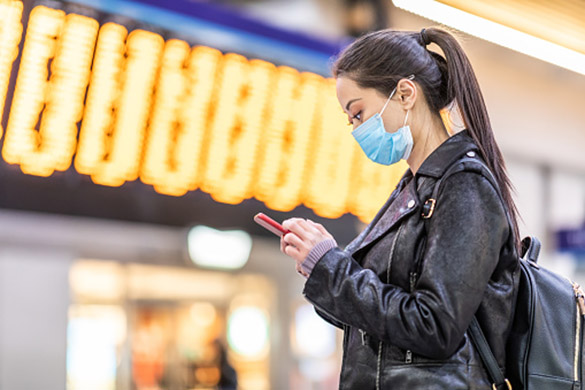
Whether you are travelling from or back to campus, we advise that you follow safer travel guidance at all times. This includes avoiding public transport, wherever possible, wearing a face covering and socially distancing at all times.
We’ve put together some tips below, however, the Government has issued detailed guidance about how to travel safely and before travelling you should read their advice on their ‘Safer travel guidance for passengers’ webpage.
Before travelling
If you’re going to travel, plan ahead and travel safely. This means you should:
- get a test before travelling, either in-person or using an at-home test. If your result is negative, you can travel. You should travel within 24 hours of a negative test result and follow safe travel guidance. If your test is positive, you should self-isolate for 10 days, follow the advice provided by your local testing centre about further testing, and do not travel.
- check the rules on what you can and cannot do
- walk or cycle if possible
- check your route before you leave, and try to avoid peak times and crowded areas
- pre-book your travel ticket online, where possible, and use contactless payment methods
- checked the latest travel advice from your transport operator
- follow the guidance on the safe use of public transport
- follow the guidance on the safe use of private cars and other vehicles– where possible only car share with members of your own household or support bubble
- download the NHS COVID-19 app before you travel, if possible, and check in where you see official NHS COVID-19 QR code posters
During your journey
Help keep yourself, other passengers and transport staff safe by taking the following precautions:
- maintain social distancing
- limit the number of people or households that you come into contact with, for example, by avoiding the busiest routes, as well as busy times, such as the rush hour
- wash or sanitise your hands regularly
- avoid touching your face
- cover your mouth and nose with a tissue or the inside of your elbow when coughing or sneezing
- travel side by side or behind other people, rather than facing them, where seating arrangements allow
- only touch surfaces where required for safe travel
- stay outdoors, rather than indoors, where possible
- minimise the time spent close to other people, where possible
- avoid loud talking, shouting or singing
- dispose of waste safely, including items such as used disposable face coverings
Please remember, that you must wear a face covering on public transport and in substantially enclosed areas of transport hubs in England, unless you are exempt.
You should follow this guidance even if you have been vaccinated, as you could still spread COVID-19 to others.
When not to travel
You must not travel at all if you:
- have been told by the NHS Test and Trace service to self-isolate
- are experiencing any coronavirus (COVID-19) symptoms
- are self-isolating as a result of COVID-19 symptoms or sharing a household or support bubble with somebody with symptoms
Please note, this guidance applies to travel within England only. See:
International travel
The latest Government guidance states that you can leave England to travel internationally but you should check which countries are on the red, amber and green lists for entering England before travelling abroad. Different rules apply in Northern Ireland, Scotland and Wales.
If you are traveling internationally, even if you are returning to a place you’ve visited before, you should look at the rules and public health advice at your destination and the FCDO travel advice.
If you are an international student you can also contact our International Advice and Guidance team.